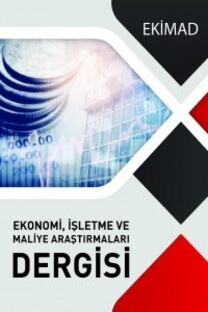Davranış ve Ekonomik Karar Verme İlişkisi
Davranışsal iktisat, Karar verme, İktisadi Özgürlük
Relatıonshıp Between Behavıor and Economıc Decısıon Makıng
Behaviour economics, Decision making,
___
- Aksoy, T. & Şahin, I. (2015). Belirsizlik Altında Karar Alma: Geleneksel ve Modern Yaklaşımlar. İktisat Politikası Araştırmaları Dergisi, 2(2), 1-28.
- Allais, M. (1953). Le Comportement de l'Homme Rationnel devant le Risque: Critique des Postulats et Axiomes de l'Ecole Americaine. Econometrica, 21 (4), 503-546.
- Alada, D. (2000). İktisat Felsefesi. Bağlam Yayınları, İstanbul.
- Bernoulli, D. (1738). Specimen theoariae novae de mensura sortis. Commentarri Academiae Scientiarum Imperialis Petropolitanae, Tomus V, 175-192. Translated by Louise Sommer as Expositions of a New Theory on the Measurement of Risk. Econometrica. 22(1), 23-36, Jan. 1954.
- Camerer, C. (1999). Behavioral Economics: Reunifying Psychology and Economics. Proceedings of the National Academy of Sciences of the USA, 96, 10575-10596.
- Ceyhan, M. S. &Taş, C. (2017). Rasyonel-İrrasyonel Tüketim: Bartın Örneğinde Karşılaştırmalı Bir Uygulama. Bartın Üniversitesi İ.İ.B.F. Dergisi, 8(16), 107-134.
- Çalık, Ü. & Düzü, G. (2009). İktisat ve Psikoloji. Akademik Bakış Dergisi, 18, 3-9.
- De Bondt, W. F. & Thaler, R. H. (1994). Chapter 13 Financial Decision-Making in Markets and Firms: A Behavioral Perspective. Handbooks in Operations Research and Management Science, 9, 385-410.
- Dekel, E. (1986). An axiomatic characterization of preferences under uncertainty: Weakening the independence axiom. Journal of Economic Theory, 40(2), 304-318.
- Etzioni, A. (1988). Normative-affective factors: Toward a new decision-making model. Journal of Economic Psychology, 9(2), 125-150.
- Gül, F. (1991). A theory of disappointment aversion. Econometrica, 59(3), 667-86.
- Gradinaru, A. (2014). The Contribution of Behavioral Economics in Explaining the Decisional Process. Journal of Procedia Economics and Finance, 16, 417-426. Heracleous, L., Th., (1994). Rational Decision Making: Myth or Reality? Management Development Review, 7(4), 16-23.
- Hoffman, A. O. I., Post, T. & Penning, J. M. E. (2011). Individual Investors and the Financial Crisis: How Perceptions Change, Drive Behavior, and Impact Performance. Netspar discassion Paper, 1-52.
- Jurevičienė, D. & Ivanova, O. (2013). Behavioural Finance: Theory and Survey. Science–Future of Lithuania/Mokslas–Lietuvos Ateitis, 5(1), 53-58.
- Kahneman & Tvertsky (1979). Prospect Theory: An Analysis of Decision Under Risk. Econometrica, 47(2), 263-291.
- Kahneman, D. (2011). Thinking, Fast and Slow. New York: Macmillan.
- Langer, E. J. (1975). The İllusion of Control. Journal of Personality and Social Psychology, 32(2), 311-328.
- Loewenstein, G.,Weber, E. U., Hsee, C. K., & Welch, N. (2001). Risk as Feelings. Psychological Bulletin, 127(2), 267–286.
- Markowitz, H. (1952). Modern Portfolio Theory. Journal of Finance, 7(1), 77-92.
- Myers, S. C. (1984). The capital structure puzzle. The journal of finance, 39(3), 574-592.
- New Economics Foundation (2005). Behavioural Economics: Seven Principles for Policy-Makers. www.neweconomics.org.
- Rabin, M. (1998) Psychology and Economics. Journal of Economic Literature, 36(1), 11-46.
- Rick, S. & Loewenstein, G. (2008). The Role of Emotion in Economic Behavior. Handbook of Emotions, Third Edition, edited by Michael Lewis, Jeannette M. Haviland-Jones, and Lisa Feldman Barrett.
- Roberts, J. W. (2002). Beyond learning by doing: The brain compatible approach. The Journal of Experiential Education, 25 (2), 281-285.
- Samuelson, W. & Zeckhauser, R. (1988). Status Quo Bias in Decision Making. Joumal of Risk and Uncertainty, 1, 7-59.
- Sapsford, D., Adams, S. L.P & Apps, E. (2009). Behavioural Economics. UK: Crown Published.
- Tekin, B. (2016). Beklenen Fayda ve Beklenti Teorileri Bağlamında Geleneksel Finans – Davranışsal Finans Ayrımı. Journal of Accounting, Finance and Auditing Studies, 2(4), 75-107.
- Von Neumann, J. & Morgenstern, O. (1944). Theory of Games and Economic Behavior. Published: Princeton University Press's Notable Centenary Titles. Resources ISBN 9781400829460.
- Yayar, R. & Karaca, Ö. E. (2019). Davranışsal İktisat Bağlamında Kamu Çalışanlarının Tüketim Davranış Eğilimleri. Akdeniz İİBF Dergisi, 19(1), 1-29.
- Yayın Aralığı: Yılda 3 Sayı
- Başlangıç: 2018
- Yayıncı: İrfan ERSİN
Davranış ve Ekonomik Karar Verme İlişkisi
Türkiye Ekonomisinde Para Politikasının Güvenilirlik Sorunu: VAR Analizi
Abdulkadir KESKİN, Mehmet Şamil GÜNEŞ, Doğan YILDIZ
Serhat YÜKSEL, Hasan DİNÇER, Özgür KIYAK
İkinci Dünya Savaşı Döneminde Türkiye’de Uygulanan Vergi Politikaları
